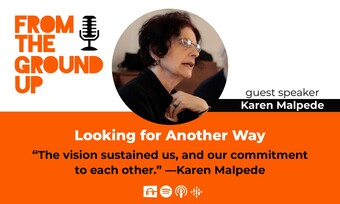The Art of the Breakup
One of the touchstone points of discussion to emerge in the wake of the publication of Outrageous Fortune: The Life and Times of the New American Play was that of transparency between artists and institutions, and its perceived lack among many playwrights who feel that they are essentially being given the run around, or led into a gerbil wheel of play development without a clear purpose in mind.
This transparency problem is real, and only further muddies a field in which individual artists’ feelings about access and opportunity will always be fraught, and tilted toward a sense of “why can’t it be me?” Theater leaders need to address this issue, however, at least as much because it is in the interest of clearer, better programming, and more efficient use of their artistic staffs’ time as out of a sense of fairness to playwrights. As someone who has been on both sides of this conundrum, as a director and more often as a producer, I can attest that in the interest of “preserving relationships” I have sent mixed, mealymouthed signals to fellow artists about the real status of their work within the organizations for which I’ve worked. All this did was lock me into a kind of mobius loop of frustration and self-flagellation, and steered me resolutely away from influencing a strong sense of artistic vision for the theater.
As I see it, the source of this problem within institutions is manifold, and born out of mainly good intentions and a desire to build relationships and community. Theaters have limited slots in a season. Depending on their mission, they may only have limited room for new plays. Artistic staffs and literary departments are charged with creating robust lists of new plays to choose from, and are expected to maintain at least superficial contact with a wide range of playwrights, so that they are somehow poised to pounce on the right play at the right moment with the reasonable expectation that the writer will warm to the offer because there is some pre-existing point of connection there. Or in the more usual case that a given playwright’s play is not chosen, they are somehow “cultivated” rather than rejected to preserve that individual’s predisposal to want her work to eventually be seen at a given theater. I’ve watched fellow associate artistic directors, literary managers, and dramaturgs at many different organizations struggle and founder professionally because of the challenges of managing everyone else’s expectations while feeling or being disempowered from expressing their own mission-centric artistic goals and ideas.

Photo by Columbia University School of the Arts.
It is time that we as artistic leaders stop trying to be all things to all people. No theater can serve all audiences or all artists who may want to be produced by them. We owe it to playwrights, who are doing a very difficult, and rarely lucrative job, to make clear decisions and communicate the truth to them cleanly and without vague, apologetic language. (Apology is condescension in this scenario. We are not actually sorry to be passing on a play. We are sorry that the playwright will potentially be upset or angry about this, and thus we are sorry for ourselves.)
The job, as I’ve observed, and done it in my time, can amount to feeling a charge to “make friends with everybody, and try to disappoint no one.” Except that it is also the responsibility of literary managers, dramaturgs, and associate artistic directors to evaluate and, yes, judge material and cull from innumerable submissions the relatively few that they deem to be most excellent and in line with the goals and mission of the company. This is where the trouble lies. The general model of artistic management in our institutional theaters has created a paradox for our artistic staffs. It is our job to choose. And it is our job to make it seem like it’s not our responsibility to choose, so that those we may not choose still like us.
It is a bit like we’re all like high school students who are desperate to be popular, and thus wish to be very picky about who we date. But we also believe that we can will all of those that we turn down for the prom to adhere to the notion that we’re dreamy and dateable. Sensible, compassionate adults would generally not spend endless energy explaining to someone who has just asked them out why they don’t want to go out at just this moment, but maybe, just maybe, if that person could work on a few things—work out, get a new hair style—and come back and ask again at the right moment, they might get a different answer. Nor would a kind, thoughtful individual meet with or write a lengthy and involved letter to someone he or she has just dumped to enumerate all of the reasons why the dumpee is essentially unworthy…at least at this juncture. And yet this is exactly what we’re doing daily to our playwrights. No wonder they’re confused.
It is time that we as artistic leaders stop trying to be all things to all people. No theater can serve all audiences or all artists who may want to be produced by them. We owe it to playwrights, who are doing a very difficult, and rarely lucrative job, to make clear decisions and communicate the truth to them cleanly and without vague, apologetic language. (Apology is condescension in this scenario. We are not actually sorry to be passing on a play. We are sorry that the playwright will potentially be upset or angry about this, and thus we are sorry for ourselves.) Artistic directors, first of all, must finally decide to stand behind the decisions of the people they have hired to filter submissions for them, and find a fair system of checks and balances in the reading process so that they can trust that good work that should be on the programming list is not being off-handedly dismissed by the least experienced on the staff or because of individual peccadilloes.
Then, and here’s where the real shift will be apparent, the rest of us on artistic staffs who write letters and make phone calls to playwrights, have to own where we stand in the decision-making process. Enough of blaming the fact that a play has not been chosen on unseen programming forces which mysteriously failed to align in the playwright’s favor. Enough of the implication, or worse, the overt statement, that an artistic director is at fault for not appreciating a play when she or he has never read it. If the buck is stopping with me, I owe it to the person I am letting down to be honest about that. And if, as is sometimes the case, I am responsible for breaking news about a play that I’d rather not, because I really do love it, and did not win the battle, I must absolutely feel free to say so without feeling like I am throwing any of my colleagues under the bus.
I am so tired of having lunches, drinks, and meetings with playwrights who cannot decipher the messages they are getting from theaters, and show me copies of endlessly nit-picky and detailed letters offering critical dramaturgical feedback from people they don’t know, and who, in most cases presumably don’t like their work enough to advance it. Playwrights need to solicit and accept feedback only from those people that they respect, trust, and rely on. Just as the man who has just been rejected by the girl or guy of his dreams really doesn’t need to turn around and look to that person for a list of his perceived flaws and grooming failures, so playwrights should not be forced to swallow dramaturgy from people they’ve never met or people who are saying no. Please, let’s simplify things and spend our presumably hard earned and well honed abilities to stir and inspire playwrights or those people with whom we actually want to work. Rejections, as in “real life,” should be gracious, clean, and quick. We must resist the impulse to justify the rejection for ourselves by offering unsolicited detail about why. No one likes to get a form letter. By all means, let’s write letters that reveal that someone did indeed read the play. If there’s something good to say about that by way of inviting someone to send future work, so much the better. Say it. If good dramaturgical feedback comes with some degree of emotional investment in the outcome of the play, then let’s save everyone’s time, deepen our relationships, and enrich the good developmental work that is happening across the country by keeping the notes for those writers to whom we wish to offer opportunity as well as insight
If artistic staff really were empowered to develop relationships with an eye to programming and equally were trusted to claim the decisions they make as their own, we might break the cycle of playwrights feeling obliged to take or seek notes from a theater that is rejecting their work in order to preserve a relationship. Artistic directors should think long and hard about whether they are hiring people to implement and support a vision that they are developing alone or already espouse, or whether they seek a cohort of people to contribute collectively to an artistic vision that will be based in commonly held goals and values. Either can work, but each has very different implications for how all of the artistic staff surrounding the artistic director interact with artists outside the organization and reveal and assert their leadership potential within it. On the flip side, all artistic leaders also have to get comfortable with the idea that in some cases, when rejected, talented playwrights will feel hurt or angry enough that they will not actually submit their next play for consideration. The fact of the matter is, though, that if we answer them politely, in a timely manner, and are encouraging in the right way if we believe encouragement is due, they are more likely to come back to us than if we string them along, answer them in mealymouthed language, and shower them with vague notions of affection as we usher them out the door.
There are, of course, times when I feel a vested interest in the success of a play or playwright that, for whatever reason, is not going to have an opportunity this time around at my own theater. Even in these cases, though, it makes most sense simply to lay that fact on the table, so that any conversation that happens about next steps with the play, or even dramaturgical suggestions, are given simply in the spirit of friendship, collegiality, and generosity. Too often we manage to imply that playwrights should rewrite to please us, and inadvertently we dangle the carrot of a door being reopened on a given play when we know it will not be.
Of course, if we are going to do the work and own the emotional risks of transparency on the theater side, playwrights will have to be prepared to hear a more unvarnished truth about the programming process. Much is made about the ancillary reasons why plays don’t get produced: cast size, technical demands, the old saw of blaming the audience, etc. But most of the time, it boils down to one thing. Someone, somewhere on the totem pole didn’t like the play enough to advance or choose it for the season when she or he had the power to do so. When artistic directors really love a play, generally speaking, they do it. These other concerns fall away.
One of my true mentors, without whose influence and support I would not be in this profession, is the estimable and under-produced playwright Kevin Heelan. Many years ago, as I was looking to find my way into the professional theater, he was instrumental in giving me my first teaching job. His first words of advice about teaching ring in my ears every time I step into a classroom to this day: “Don’t try to make them like you. Teach them. If you love the subject and you do your job right, most of them will like you. And those that don’t will have to respect you.” We as artistic leaders at all levels could stand to apply this wisdom to building the relationships we seek with playwrights, and other artists for that matter. If we stop focusing on the rewards of being liked, and devote all of our energy to making excellent work, we will suddenly find that we truly have deep, fortifying, transparent relationships that will last our entire careers and beyond. Isn’t that why we all got into this in the first place?










Comments
The article is just the start of the conversation—we want to know what you think about this subject, too! HowlRound is a space for knowledge-sharing, and we welcome spirited, thoughtful, and on-topic dialogue. Find our full comments policy here
I'd like to see this as required reading and I concur with much in the responses of Beth and Zak. From the writer's end, what I value in a letter is timeliness, and if the reader has a comment, about how they received the play--what popped for them, what questions it made them consider, or if it brought a further question. I have to be discerning about what feedback I take--when was the play read--and does the feedback still feel relevant? It is my choice to take feedback and then say to someone who is invested in the play's present and future, "what do you think of this comment with regard to my play, the reader may be onto something but I would like a second opinion." Something to also consider: let the writer know who read the play in the rejection letter--is it a committee, a lit manager, an AD, an intern, a paid/unpaid consultant/reader?
I've been on both sides of the table, I've done coverage for theaters and I was aware when there was going to be a second reader and when there was not, but the writer doesn't know. Make the process transparent and direct, so that writers don't feel led on and are able to receive support where it is authentic--where the reader cares about the life of the play and/or the writer's journey.
Theaters: when you get a play from a writer, respond. If you don't have the staff for it, consider being open about that and don't accept submissions until you do. Or say: I'm sorry, we are reading plays but we don't have time to read yours, rather than collecting plays and having them sit on the shelves for 6 months or a year. Develop a policy and stick to it. It takes us 2-6 months to read new plays but we will get back to you within six months. Then the writer doesn't have to wonder, is the play lost? Writers and agents don't want to remind a theater that they haven't responded to a play any more than a parent wants to say more than once, have you cleaned your room?
And if you've asked to read a play, then read it and respond to the writer, because it's disrespectful to not acknowledge that someone has given you their work. Euphemisms can be retired. Just be straightforward. "It doesn't fit into our season at this time" may be true, but it says nothing about the play. If you're overloaded with work, ask for help, assemble a team, do anything that avoids a stack of 250 plays on your desk or shelves. Study constructive ways of saying NO and test them out. It isn't about being liked on either end, it's about the work. Lastly, be kind to writers sending out their first scripts. I teach writing and it takes a lot of courage to take that first step, before one has built up a skin and a comfort with acceptance or rejection.
Christian -- you rock.
Well said, Christian. I too have been on both sides of this; sending and receiving the dreaded letter. And this article really helps put in perspective the challenges on both sides, and the difficulties I have grappled with in terms of responsibility. I will take it to heart in the future.
Bravo Christian! I hope other producers will follow your lead with a goal towards greater honesty/clarity/transparancy. For years I've bemoaned that most responders to work heap praise on artists only to get in the elevator after a reading, hit the sidewalk after a show or turn to a colleauge after writing the praisefilled "no" response to say "boy, that was terrible." No one needs to be mean but we do need to be honest. The end result of all those white lies? Writers who will continue to believe for YEARS that a theater is interested in their play if they only tweak four more lines when I know the truth is that the theater has no interest in their play and they need to move on. And directors who think they are thisclose to getting hired by a theater when I know they are at least five years out.
I think it would be a very rare day when a previously rejected author would decline a production. Or an agent wouldn't send the play because the past work wasn't accepted for production. It would take an event of Greek proportations for an author to truly stand by "I'll never let that theater do my work." When the "yes" finally comes, they'll jump at it.
But in the interim we are creating a generation of artists who aren't hearing honest reactions to their work. And that's a loss for them in terms of artistic growth. What's wrong with saying "this one didn't work for me, but I'd like to see what you create down the road." And maybe, just maybe, an honest conversation about why something didn't work would create the kind of ongoing, creative, useful dialogue that a "your play is terrific, I'm so sorry we didn't have a slot for it" letter wouldn't.
There are many wonderful aspects to this, Christian. Not the least of which is your shout out to Kevin Heelan who I've known since childhood and agree is wildly underproduced.
I'll save most of my response for a future drink, but one thing I wanted to add in this forum is that I think many pro-civic, pro-social, pro-culture organizations work from a perspective that the appearance of inclusiveness and thoughtfulness trumps practical needs and dynamics. We are hosts and curators of human effort and expression, of deep personal emotion and history, and it feels antithetical to our mission and to our soul to say to anyone "you're not included".
So we do a lot of things that are counterproductive for our own institutions, for the artists in our midst, and beyond. We accept too many scripts, offer too many mirages of opportunity; we say things like "as of now" or "I wish it were otherwise"; we contort ourselves to appear like idealistic, open homes of thought and artistry; we suggest anything is possible for anyone, as if we're all diving head first into haystacks, reaching for every potential needle no matter its dimensions. When it's evident to most everyone this is neither possible or true.
I don't think we do this to make friends, keep friends, or be popular -- maybe some do -- but I think it's as you suggest, a self-centered enterprise to be able to look in the mirror and not feel you've become a vampire.
I'm not suggesting we embrace our inner fangs or let go of the desire to acknowledge as fully the work of artists even in the context of a rejection, but I think you're absolutely right that we do need to let go of this effort to appear more perfect than we are. It never works anyway. The pimples, cold sores, and crooked teeth are always there. And the prom never goes as planned.
One of my mentors once told me, "Why would anybody listen to my opinion if I am not going to produce his play?" Her philosophy was clean, clear, and direct. And I took the lesson into every aspect of my professional life. She also modeled a tight knit and impressive community giving each other valuable feedback at crucial junctures in the development of what became truly historic work. I took those lessons with me when she said,"You're fired. You've outgrown this job." Clean, clear, direct. Afterwards, she got me the gig that launched my career.
Thanks so much. This is honest and fair, and we all have to deal with this every day; there are just way too many good plays and way too few opportunities for production. To make matters more frustrating, we need that moving canvas of actual actors and a smart director to even understand what we've got, most of the time. So dramaturgy from someone who does not know your work or your process, based on just reading a script once, is often not worth much. Playwrights beware! I feel we need to "grow our own" network of local actors and directors, and getting their feedback is often far more helpful than reading a detailed critique from someone at a fancy theater.
From a playwright, thank you. I have a stack of glowing rejections, oozing love, which nevertheless mean one thing: no. It's nice to know the play was read, and liked, and I could submit future work. But I'd need to be Tallyrand to decipher the subtext hovering before that final No.
John Morogiello's play, BLAME IT ON BECKETT, which played at the Abingdon earlier this season, makes many of the same points...and is devastatingly witty.
Bravo! This piece articulates a much-needed vision not just appropriate for the theater, but for any business. In the end, it's all about treating one another with mutual respect, isn't it?
Parker is generous and sympathetic to writers, but I think we writers can also be taken to task for simply not asking direct questions. Yes, those rejections hit us where we live because we've put our hearts on the page, but that's what friends are for. And there's a reason it's called "show business" and not "show friendship."